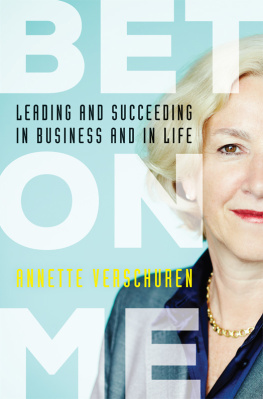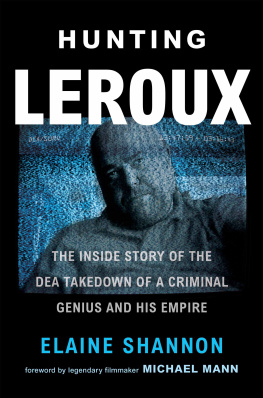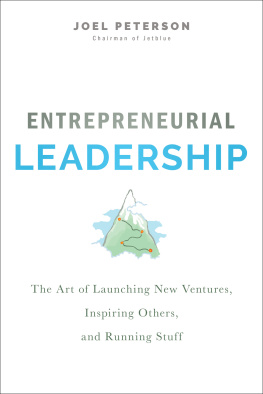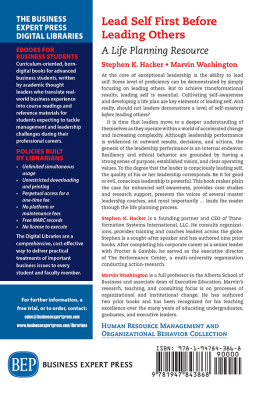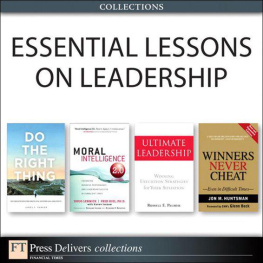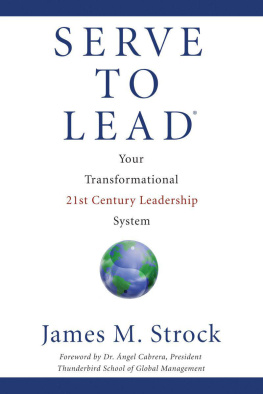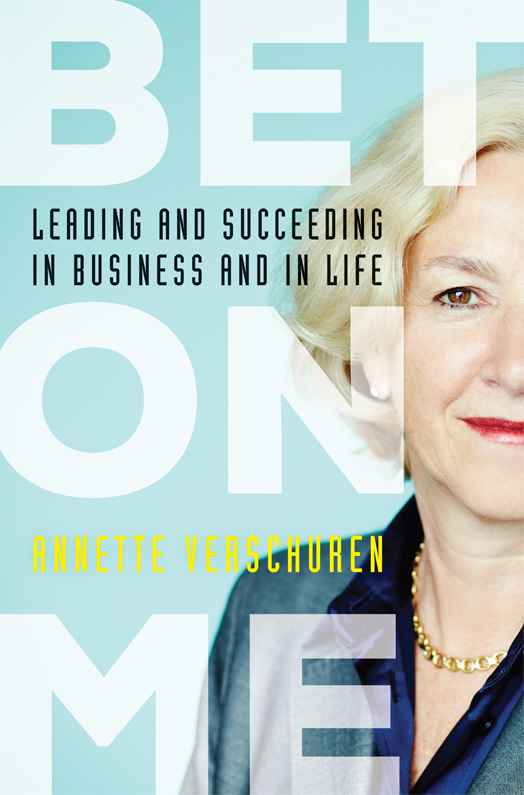Annette Verschuren is a great Canadian leader. Having known her for more than three decades, Ive long been an admirer of Annettes exceptional leadership qualities, her entrepreneurial expertise and her commitment to the greater good. Shes also helped to foster the next generation of leaders, including through the Governor Generals Canadian Leadership Conference, which she chaired in 2012 with impressive results.
This is a splendid book that tells Annettes story in her own words. In fact, it is at least four books in one volume. Each is a gem with wide appeal. First, Annette has given us a compelling personal story. The third of five children growing up in a Dutch immigrant farming family in Cape Breton, Nova Scotia, she learned at an early age what it was to work hard and to believe in oneself. Here we see a portrait of an intrepid young girl who would go on to excel in business as a woman pioneering her way in a mans world. Character, energy, resilience and a tenacious optimism shine through in these pages. This is a journey of intriguing personal stories, some humorous, some humane and some hugely challenging. Throughout, were treated to an instructive view of the road travelled and gain a sense of Annettes infectious optimism and eagerness to tackle new challenges.
The second story within this volume is about leadership. Time and again we witness Annettes intriguing ability to view obstacles as opportunities. From her willingness to make her way in the traditionally male-dominated business world to her insight into the demands of leadership in the twenty-first century, we come to understand the qualities that lie behind her success. They are qualities of teamwork, of self-awareness, of resilience, of creativity and of the ability to learn from failure. One example of these qualities in play can be seen in the story of Annettes current efforts in the innovative field of energy storage. Two other leadership qualities are predominant. One is her focus on the triple bottom line, which aims to balance a return on investment with sustainable development and the creation of social capital. The other leadership quality that stands out is Annettes philosophy and practice of giving back to community and to country. Its an example that has inspired many.
Building on the leadership theme, the third story focuses on the modern organization and the impact of an accelerating pace of change that has seen revolutionary innovations in areas such as retail operations and supply chain management. Instructive lessons can be extrapolated to all manner of modern enterprises and organizations. Annettes stories are candid and own up to past successes and failures alike, including an account of her leadership of Home Depots unsuccessful venture into China while she was also heading up the companys most successful Canadian division. Her insights and anecdotes are compelling, illustrating the complexity of globalization, and the imperative to understand and integrate local realities, to allow time for success to take root and to constantly nurture skills and talent while navigating change.
The fourth story in this book is a triumphant and inspirational one that speaks to the idea of Canada. Its about a family that chose this country after leaving the Netherlands following the devastation of the Second World War, settled in a challenging landscape and built a successful farm with tenacity, optimism and reliance on friends and family. In this, Annettes story is the story of so many of us. This is a country in which wave after wave of immigrants has arrived with new energy and ideas, creating a richer and more vibrant society in the process. Fairness, hard work, resilience, civility, innovation, openness, the absence of rigid class or hierarchical structures: these are the Canadian values we most celebrate and they are a constant presence in Annettes story. They portray Canada as a smart and caring country.
This book draws the reader in. As I put it down after reading it in one sitting, I thought of a story Id once heard that took place almost a century ago in England. The setting was an elite London art gallery. On display was an exhibition of some of the first Group of Seven landscape paintings. The paintings were vigorously panned by Londons leading art critic. He cited one Tom Thomson work in particular, The West Wind, an iconic painting of a lonely pine tree growing out of a rock and leaning at a precarious angle. The critic suggested that this painting had none of the pastoral gentleness, the soft and soothing colours or sense of grace in design of Turner or Constable, the great English landscape painters of the previous century.
In reply, a less-noted but more perceptive critic, who had seen the Canadian landscape first-hand and knew something of the Canadian character, said: That is just the point. This lonely pine tree emerged from granite. It has had to withstand a severe temperature range from intense summer heat to winter ice. It has had to grow and thrive in gale-force winds. It is tough, creative and resilient, and built around unusual challenges.
That is the nature of Canada, the critic said. These paintings are the essence of the Canadian character.
Similarly, Annette Verschuren has given us a book that reveals something of a smart and caring country. It is told in a highly personal, direct and conversational style, and it stimulates inspired thoughts about the idea of Canada.
His Excellency the Right Honourable David Johnston Ottawa, September 2015
I think youre going to love it, the office manager told me, moments before we stepped into my plush new digs. It was 1996 and it was my first day on the job as president of Home Depot Canada. I was a thrumming mix of excitement, nerves and surging confidence.
My guide led to me to an imposing black door. He pressed a button, the door swung open and he gestured for me to walk through. He pressed another button just inside the office and, as quiet as you please, the door closed behind us again.
Well? he asked, smiling hopefully, what do you think?
It was the biggest, grandest office Id ever seen. And I had seen some grand offices. Five hundred square feet, expensive artwork, full bathroom and shower, no expense spared.
Two thoughts flashed across my mind. The first was that the girl once affectionately known around her hometown as Poopie had come a long, long way from the milking stalls of her youth. The second was that, as grand as the office was, it had to go. It was beautiful, it was impressiveIt. Just. Wasnt. Me.
I smiled supportively at the office manager and made a beeline for the desk. Very impressive! I said. And Ill probably be making some changes.
A few months later Id cut my office down drastically. In the space that had once served as a sprawling sitting area, there was a newly constructed meeting room and audiovisual centre available for use by all employees, not just the president. The button that automatically closed the door behind me was gone, as was my cushy parking space closest to the front entrance. The parking lot was now a strictly first-come, first-serve operation. I parked as far from the front doors as possible, and walked through the store that was attached to the head office so that I could connect with as many customers and employees as possible before starting my day.
My actions were seen as inspiring by some, unsettling by others. I wasnt trying to be bold or radical. I was just being authentic. The pulse of any business is on the front lines, where employees and customers meet. I didnt want the trappings of my CEO statusbe it a luxury office or a premium parking spotto insulate me from the people I served, or vice versa. Id stepped into the biggest job of my life at a time when the business world was entering a period of unprecedented change. Emails were beginning to replace couriers and intra-office memos. Cell phones were fast becoming a non-luxury device. A farm girl from Cape Breton had just been named president of Canadas leading construction and hardware company. The world was changing faster than anyone had anticipated, and I figured that if I was going to succeed, I needed something solid to hang on to. And that solid thing wasnt a title, a legacy or a swanky office. That solid thing was

